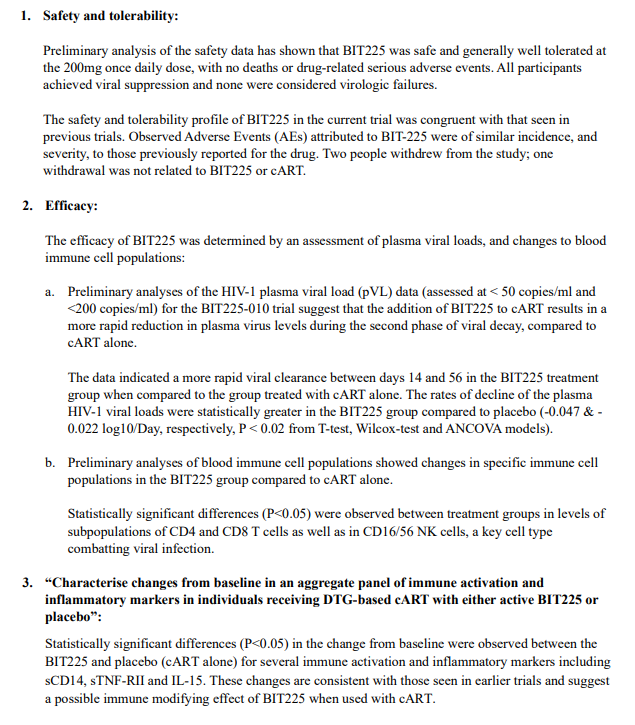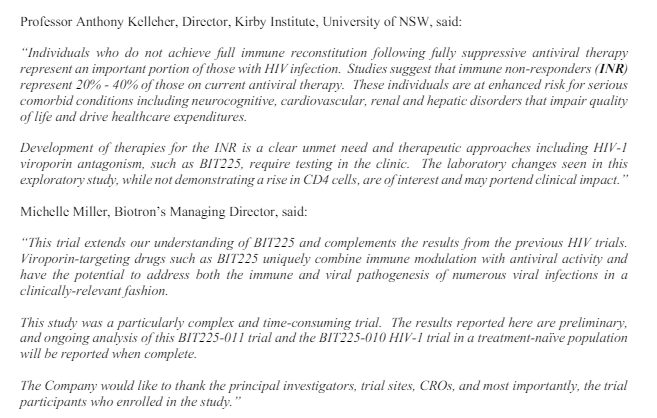Notizie scientifiche e mediche riguardanti il virus, l'infezione e la malattia da HIV. Farmaci, vaccini e cure in sperimentazione.
-
uffa2
- Amministratore
- Messaggi: 6942
- Iscritto il: lunedì 26 novembre 2007, 0:07
Messaggio
da uffa2 » venerdì 5 aprile 2024, 8:59
a volte ritornano

beh, sono contento dei buoni risultati, anche se, dopo 13 anni, siamo ancora in fase II: qui fanno prima a completare il ponte sullo Stretto di Messina

poi, continuo a chiedermi se hanno capito per vogliono usarlo, ma vabbe', almeno altri dieci anni questi se li prendono...

-
Dora
- Messaggi: 7542
- Iscritto il: martedì 7 luglio 2009, 10:48
Messaggio
da Dora » mercoledì 19 giugno 2024, 6:26
Dora ha scritto: ↑venerdì 5 aprile 2024, 5:59
Dora ha scritto: ↑lunedì 1 novembre 2021, 6:06
Ci hanno messo un altro anno a decidere, ma Biotron
comunica che sono in partenza due sperimentazioni cliniche, che hanno l'obiettivo di approfondire lo studio dei risultati del trial di fase II BIT225-009.
Se negli anni scorsi il BIT225 è stato testato su persone naive, uno dei due nuovi trial - che si svolge in Australia, a Sydney e dintorni - è diretto a persone già precedentemente trattate con altri regimi di cART e hanno viremia ben controllata, e la bella notizia è che includerà anche immunologic non responders, persone che non hanno raggiunto una completa ricostituzione immunitaria nonostante anni di soppressione virologica.
Nel trial
BIT225-011 il BIT225 verrà aggiunto alla cART per 12 settimane e poi sospeso.
Il trial BIT225-010, che invece si svolge in Thailandia, si rivolge a persone con recente diagnosi di HIV, che non hanno ancora iniziato la cART: i partecipanti prenderanno il farmaco in studio o un placebo, aggiunti fin dall'inizio a un regime standard di cART, e lo faranno per 24 settimane (il doppio di quanto fatto in trial precedenti). [...]
Primi risultati sulla sperimentazione thai (
BIT225-010) anticipati in un
comunicato stampa di Biotron: analisi preliminari confermerebbero che gli obiettivi principali del trial, che - ricordiamolo - è di fase II, in doppio cieco e con placebo, e indaga sicurezza ed efficacia, nonché impatto del farmaco + la cART su alcuni marker infiammatori e di attivazione immunitaria, siano stati raggiunti.
I dati, inoltre, sarebbero consistenti con l'ipotesi che il BIT225 agisca anche sul virus dei reservoir.

Commento di Biotron:
“The positive outcomes from this trial further our understanding of BIT225. The blood (plasma) viral load data in particular should be highlighted, as it suggests that BIT225 is having an impact on a critical phase of viral decay when latent reservoirs are established. Current cART is efficient at rapidly and durably reducing virus levels in the blood, but this does not translate into clearance of latent reservoirs. The observed changes to immune markers and cells further the results from the previous 009 trial and suggest the utility of targeting viroporins as a new class of antiviral
drugs.
The results reported here are preliminary, and ongoing analysis of the BIT225-010 study, as well as its companion study, BIT225-011 in HIV-1 chronically infected individuals, will be reported when complete.
We would like to thank the principal investigators, trial sites, CROs, and most importantly, the trial participants who enrolled in the study.”
Aggiornamento - sempre via
comunicato stampa - sull'altro trial attivo,
BIT225-011, sugli
immunologic non responders.
Secondo quanto riferito da Biotron, le analisi preliminari indicherebbero che gli obiettivi principali della sperimentazione siano stati raggiunti:
This longitudinal, open-label Phase 2 trial was designed to characterise the effect of BIT225 (200 mg, once daily) added to ongoing, suppressive standard of care antiretroviral therapy (cART) for twelve weeks in twenty HIV-1 infected, treatment-experienced participants who had achieved only partial immune reconstitution. Trial details are set out in the attached
Addendum.
The primary objectives of the trial were to evaluate the safety and tolerability of BIT225 in this patient population, as well as to determine the impact of the addition of BIT225 to cART on immune activation, inflammation and viral markers.
A summary of the preliminary results is set out below:
1. Safety and tolerability:
Preliminary analysis of the safety data has shown that BIT225 was safe and generally well tolerated at the 200 mg once daily dose, with no deaths or drug-related serious adverse events.
The safety and tolerability profile of BIT225 in the current trial was congruent with that seen in previoustrials. Observed Adverse Events (AEs) attributed to BIT225 were of similar incidence, and mild severity,to those previously reported for the drug. One person withdrew from the study following the first dose ofstudy drug during the treatment period.
2. Determine change of immune activation, inflammation and viral markers:
Baseline values for a range of immune activation, inflammation and viral assays were determined for each person during an initial 4-week Observation Period. Subsequent values of the same markers were assessed during the 12-week treatment period with BIT225, as well as during a 4-week Follow-up Period after completion of BIT225 treatment. Analyses of Treatment and Follow up values were compared to those obtained during the Observation period.
All participants maintained viral suppression throughout the study. Statistically significant differences (P<0.05) in the change from baseline were observed during the BIT225 treatment period for several prespecified immune markers and cell populations. These included NK cells, a key cell type involved in combating viral infection, and T-regulatory cells. Changes in these cell populations have been noted in previous trials with BIT225 and suggest a possible immune modifying effect of BIT225 when used with cART.


